When Sugar Rush debuted on British television in 2005 it wowed audiences with its frank and energetic depiction of a gay teen in love with her best friend. Based on Julie Burchill's novel, the show was groundbreaking and raw television show that featured vibrant lesbian and bisexual characters.
The critically acclaimed show won several awards, including a Stonewall Award, for its in-your-face, sexy and fun story. When it premiered, British actress Lenora Crichlow, who played Sugar, garnered a devoted lesbian following, which she continues to enjoy to this day.
On a recent trip from England to promote Sugar Rush, which is currently debuting in the States on here! Crichlow sat down with SheWired to chat about the show's impact, life, her lesbian fans and what it was like playing Sugar! Just imagine her responses in her British accent...
SheWired: At the end of Sugar Rush, I know that it wasn't known until the last minute that there wasn't going to be a third season. Were you happy with where the characters ended? Or where would you have liked to have seen them go with the story?
Lenora Crichlow: I think because of the expectation of a third season, it felt a bit like 'Oh, ok." I think the writers and producers and the whole production team had anticipated a third, and kind of set up the situation for the characters and storyline for a third. So it was a bit of a shock. I mean, in hindsight, it was fine. It was lovely to leave on a high. But, yeah, I always have those moments where I think "What if? Where would Sugar be now?" But, you know, it's all turned out decently, And things happen for a reason, I'm sure.
SW: Did the show have any significant effects on either your personal or professional lives?
LC: Oh, so much, yeah! Professionally, it was brilliant, because it was a fantastic springboard for me to kind of do other things. And they're a lot of fun. And even though it was received, and was very popular, it felt like quite the culty show, I think because it had the whole gay and lesbian following and kind of an untapped market, I'd say, a little bit. So that was hugely positive. And personally, I've got a huge amount of respect and friendships from fantastic actors I worked with. It was good fun, really good fun, so yeah, very positive.
SW: So, what is Brighton really like?
LC: COLD! Really cold! I know they've got lovely lighting and grading and all that which makes it look fabulous, but its not. It's freezing! Especially compared to here. And like night shoots on the beach in skimpy Sugar outfits, the shoes - gotta love the shoes - on the pebbles... not very practical. It's very cold, but it is such a lovely, lovely place, and the perfect place to set Sugar Rush. There's a huge gay and lesbian community there who have been incredibly supportive of the show. And I think it's a bit like Sugar Rush in that it's a bit quirky and kind of mixed but also feels quite like your own little world. And then you've got the beach, and the beach front, and lovely shopping, little boutiques and stuff like that.
SW: On that kind of note, where are your favorite places to travel?
LC: LA, of course. I love just traveling in general, to be honest. I do love leaving the UK, I mean, I see quite a bit of the UK, and even though it is travel, it doesn't quite the same as getting on a plane and going somewhere where the weather is completely different. I left London under eight inches of snow, and I'm here now. (Laugh) So I love America, and I love Trinidad, the Caribbean, where my dad is from.
SW: Do you feel that the lesbian following that the show has generated has really helped your career at all? Has it made a significant difference or the same as any other role?
LC: I sense that it has made a significant difference in the sense that it's opened my eyes to perhaps people and situations and issues that I wouldn't necessarily have come across. We also won a Stonewall Award, though, and I remember that was quite moving actually. Being just in on the whole ceremony and seeing what the Stonewall is - the Stonewall was a political fight for rights and equality really. That was very humbling for me. There were lots of women and gay women who came up and sort of said, "we felt represented by Sugar Rush. You weren't butch, or shaved-head; you weren't sort of stereotyped. And you weren't just two young pretty girls getting it on for the straight audience.
It felt quite genuine, and integral, and Kim and Sugar, you know their friendship and the complications." And it just kind of really took me back into thinking; actually, yeah it probably dubbed me more than just a show, just to have it out there as nitch-y, just to have people talking about it. Its not very mainstream, yet the issues of love, and high school crushes, and families being messed up, and girls in general, I mean that's as mainstream as you get. So, it just was an interesting take on it. Yeah, it's opened huge amounts of doors, and opened my mind more than anything. Seeing it from your point of view, the lesbian point of view, I think it is a big deal, like when I first saw mixed race people in bands or on TV, I identified with it straight away and it meant more to me, than probably a lot of people, just for the identification, so that was good.
SW: So what is it like being adored and crushed on by a bunch of lesbians?
LC: Beautiful, beautiful yeah. Yeah, I highly, HIGHLY, recommend it. [smiles] It's fantastic.
more on next page...
\\\
(continued)
SW: Taking into account the difference in censorship, do you see the US viewers and fans differing from the UK?
LC: Well the reactions both in New York and at home have been a mixture of age ranges. I think there were a lot of teenagers who did get in contact with us, I felt like it was very much straight teenagers and teenagers who were coming out or coming to terms with coming out. And I think that's because of the format of the show. It wasn't very long, it was very poppy, its very fast, its quick, it deals with young issues. And so I think if you put the heavy sexuality sort of on the side, it was just a fun young show with angst. I think above that it did tend to be kind of the gay and lesbian older community did respond to it and see the significance of it.
SW: With as many gay and lesbian stories and letters you received from fans, did you get much mail from people relating to Sugar's struggles?
LC: Yes! Yes, sure, because Sugar's not actually gay, she's just...not fussy. [laughs] She's just generous! [laughs] So, I think that Olivia (Hallinan's) character, Kim, attracted a lot of the "I totally relate," and "you've spoken to me on my coming out and angst." But for Sugar, I got quite a bit of people identifying with kind of how lost she is, even though everyone thinks she is very popular. She is very lost. Especially in the second season, we explore it more, she never had a friend like Kim, who loves her, just actually loves her as a person, and it's not only sexual. There's a friendship there, and a very deep friendship. So there's all those issues, which are tapped into. And Sugar's quite bold, There's a lot of people that just got her boldness, and just thought she was fun and fashionable, which, I was just sort of like "REALLY?" [laughs] So yeah, I got a bit more of a mix than I am sure Kim as a character attracted with much more of the coming out stories.
SW: So what parts of Sugar do you actually relate to as you?
LC: As me? Um, I think she's very loyal. Funny enough, I do think she is very loyal. I think she is very honest. So I kind of relate to that, and I relate to her -- she kind of invests in herself, she is fun to be with [laughs]. Which I think (maybe not on paper), I like to think I am [laughs]. She's un-judgmental, which I love. And it's not necessarily the arrogance I relate to, but its just the "so what" the "come one, so what, it doesn't matter" and I like that about her. There's a lot of issues that aren't necessarily me, but what I admire in her, is her boldness, and her bravery to say whatever. And she is having quite a tough time, and despite all that she does have a laugh, even though it may be a bit drunk [laughs].
SW: She does consume a lot of alcohol.
LC: Ha, yes! Quite a bit!
SW: Are there any actresses, British or American or from anywhere, who've played lesbian roles or on shows with lesbian storylines that you looked up to when you first got this role or since then that you admire?
LC: Before I started the project, I can honestly say no. That makes me sound like I didn't do my homework. I think for both Olivia and I, it was let's not play lesbians let's just play young girls who stay true to what they are going through. So those influences came from straight girls I grew up with or lesbians who we met on the beach. It was just like whatever influences Sugar or Kim as characters, I don't look to say 'how do you play a lesbian?' because it doesn't exist, It's not a character trait. But since then, I remember seeing Monster, and thinking that was just a stunning performance by Charlize Theron, and just so complex. I don't know quite what I got from it, but I got a lot from it. I think just overall, for me, playing Sugar was just lovely, it opened my eyes to a whole new kind of world, and what women go through when they are gay. I think there are a lot more gay men in the media, but the lesbian community is not necessarily as much. I don't know how much one is exposed to it if you don't go looking for it. But other than that, I don't think you can play a lesbian, you play a character, and if she happens to be gay, she's gay.
SW: Back when you and Olivia did the interview with lovechicks, they brought up my best friend, Arlan, and her "I'd go gay for..." shirts that she sells. When they asked you to fill in the blank, you first said Olivia, but then they said you weren't allowed to say each other, so you said Angelina Jolie. Has that changed?
LC: [laughs] Angelina Jolie, I think she's just so funny. She's absolutely, absolutely stunning! So, no it hasn't changed.
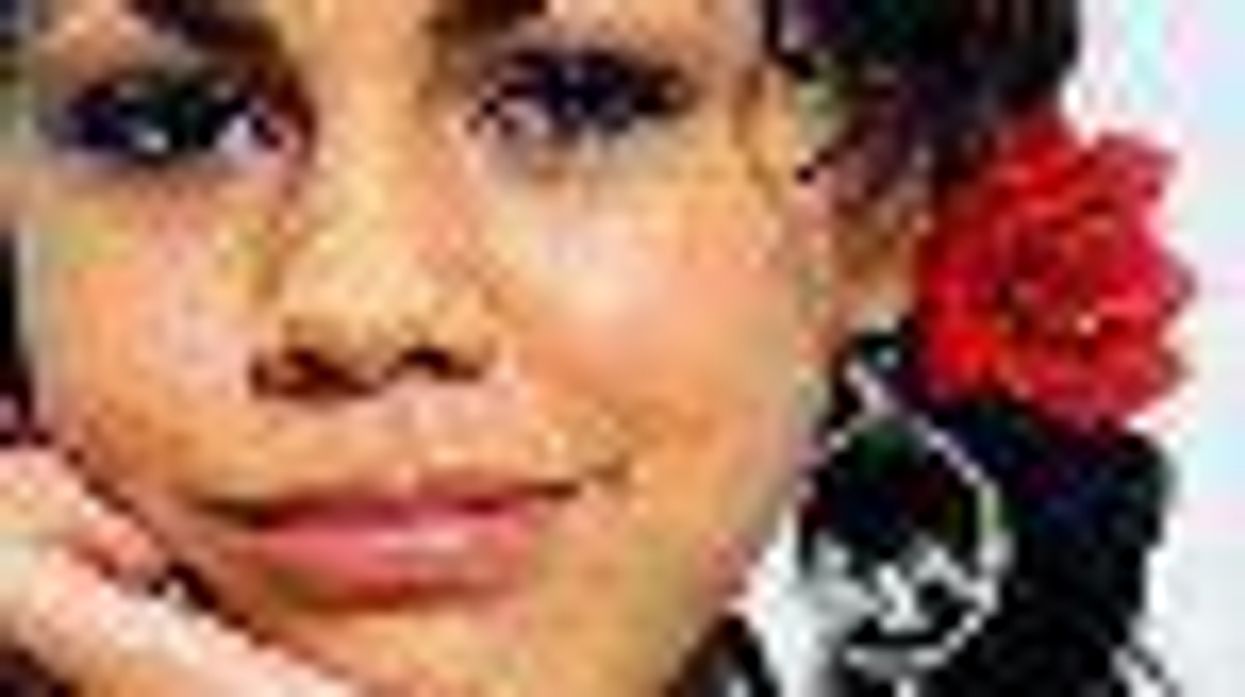

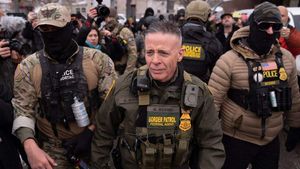





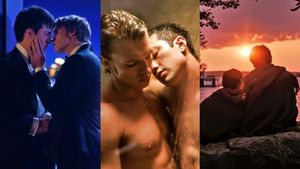

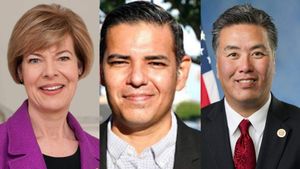

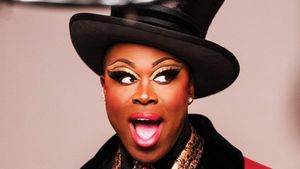


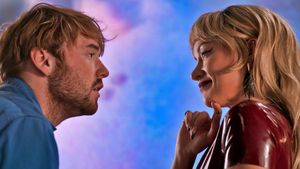

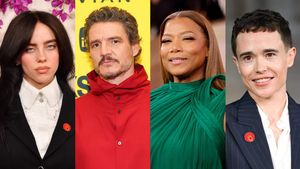




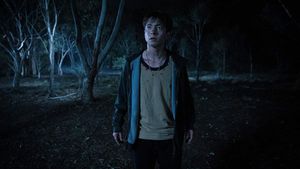
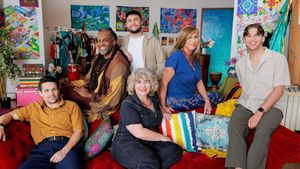
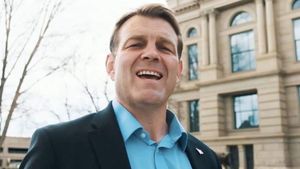






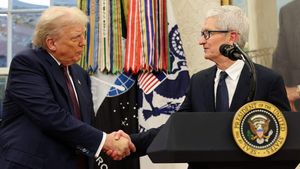

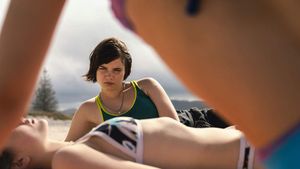







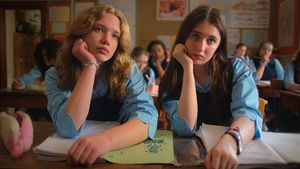




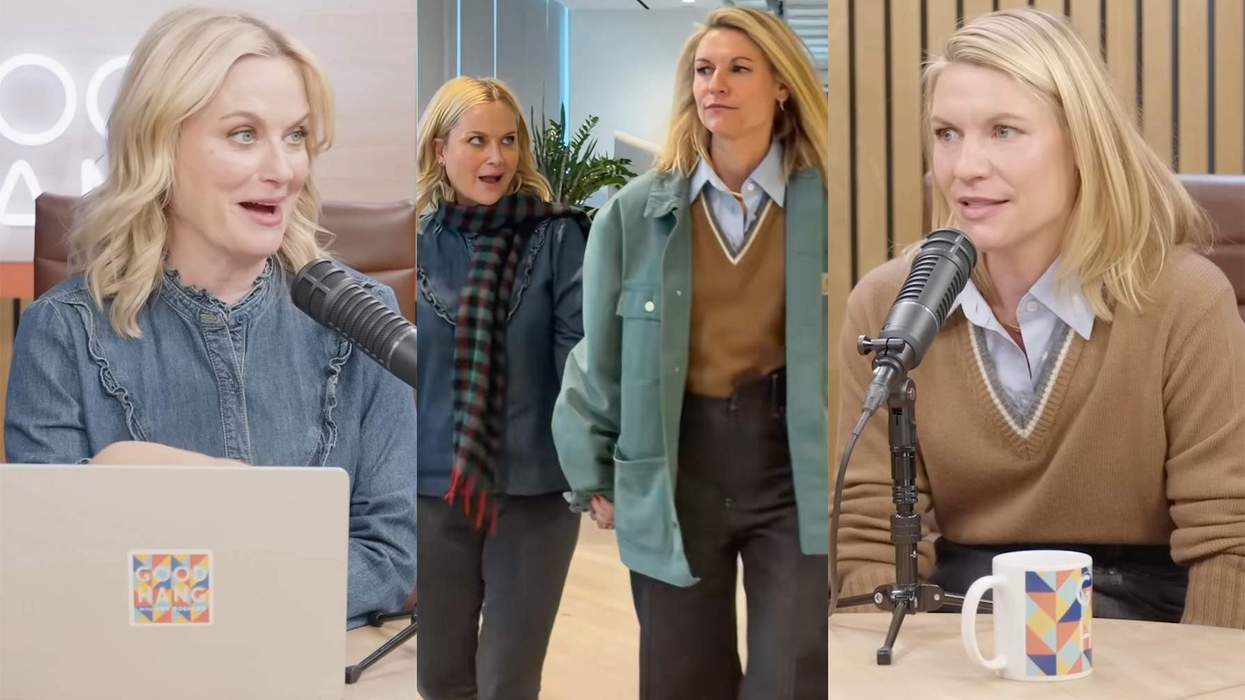
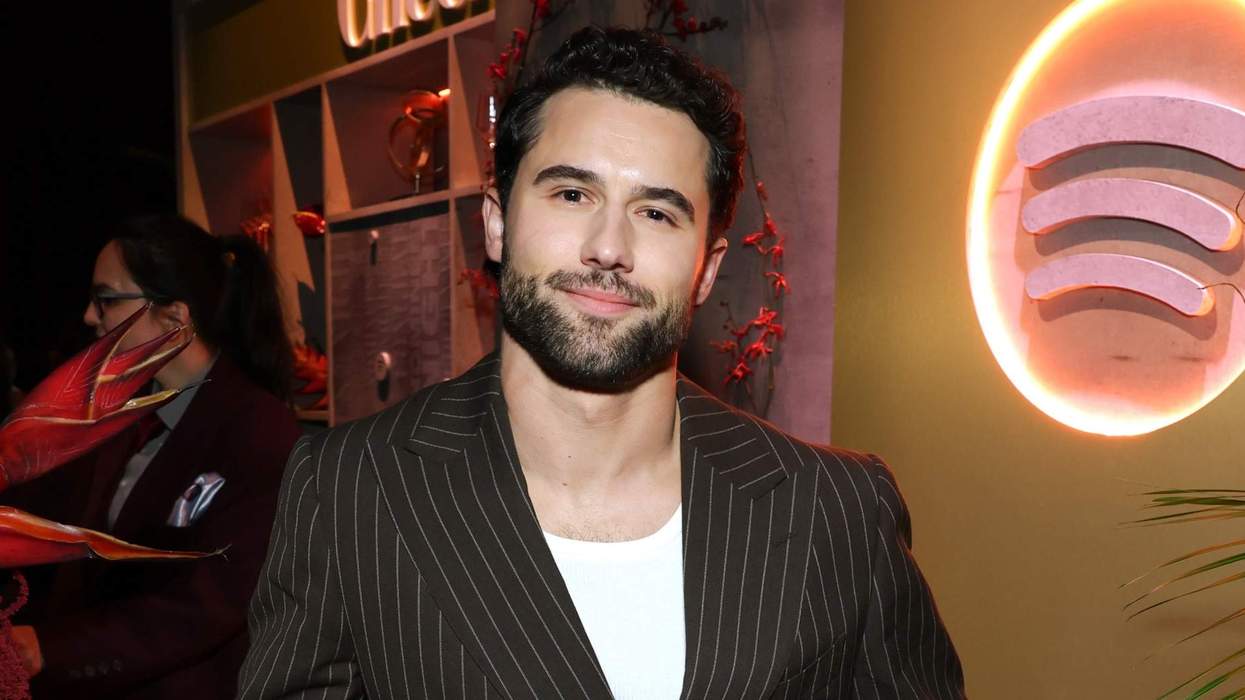
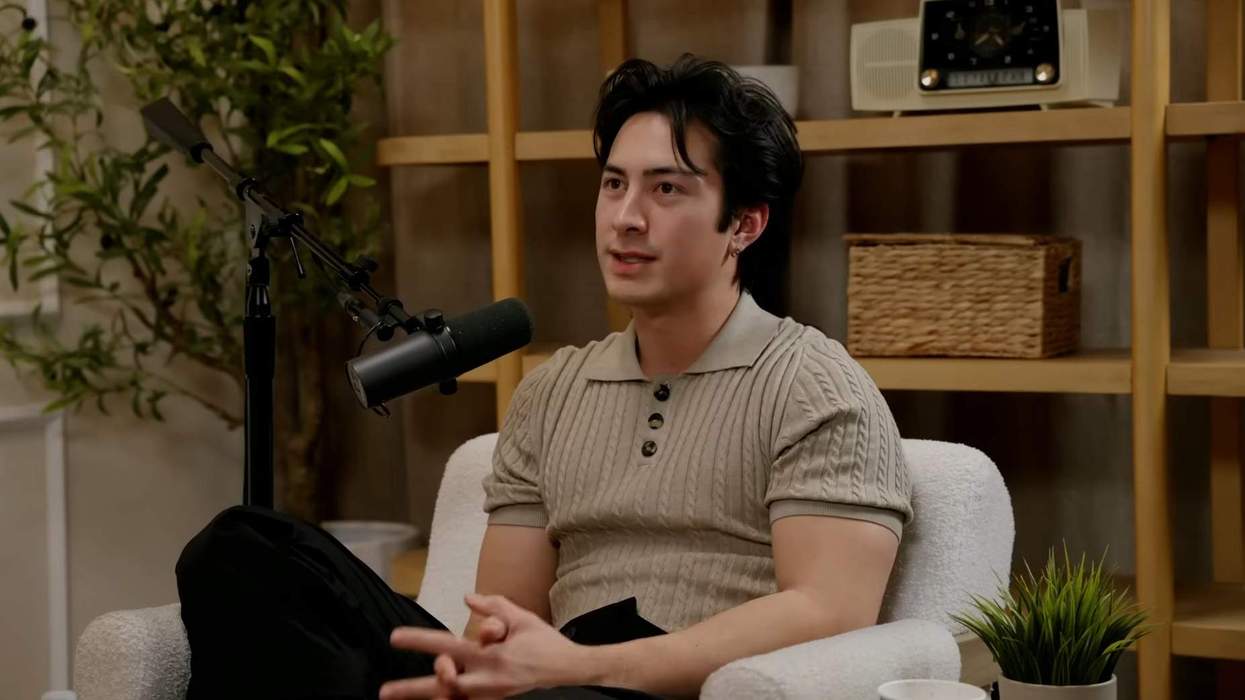
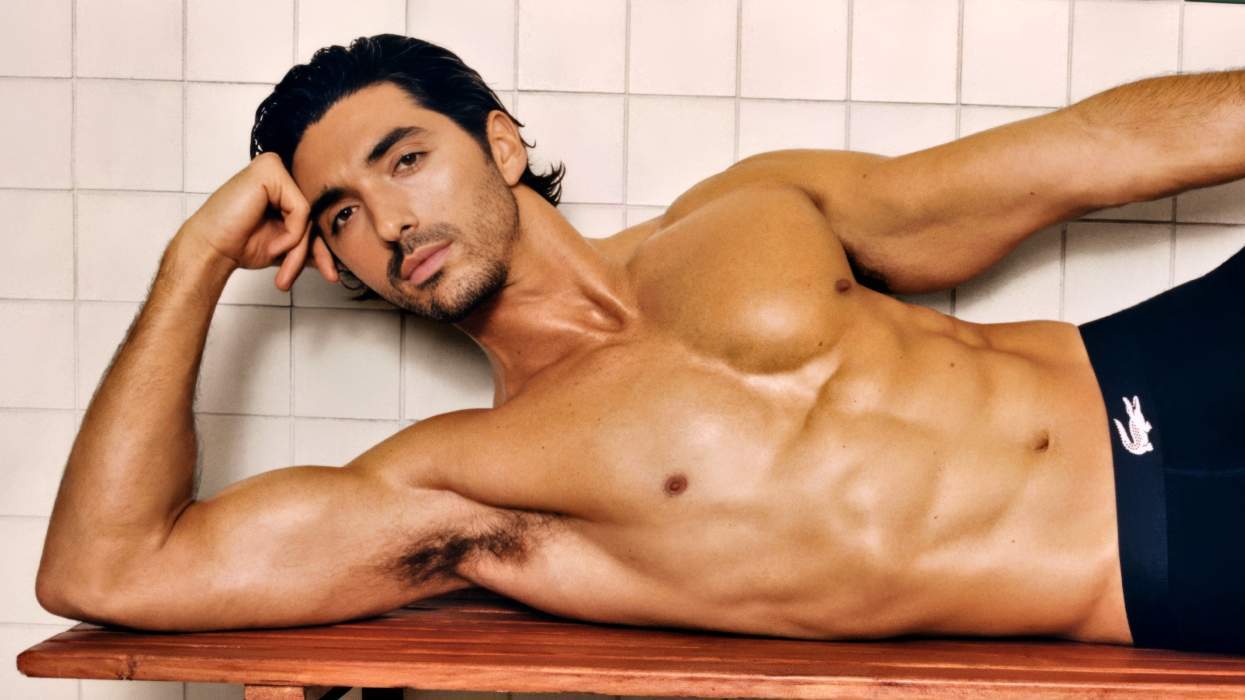





































 Cindy Ord/Getty Images
Cindy Ord/Getty Images























